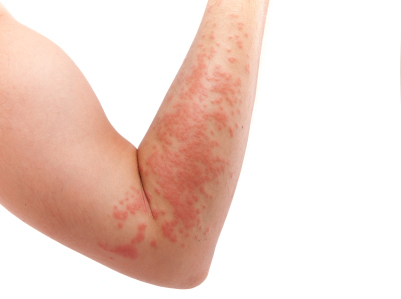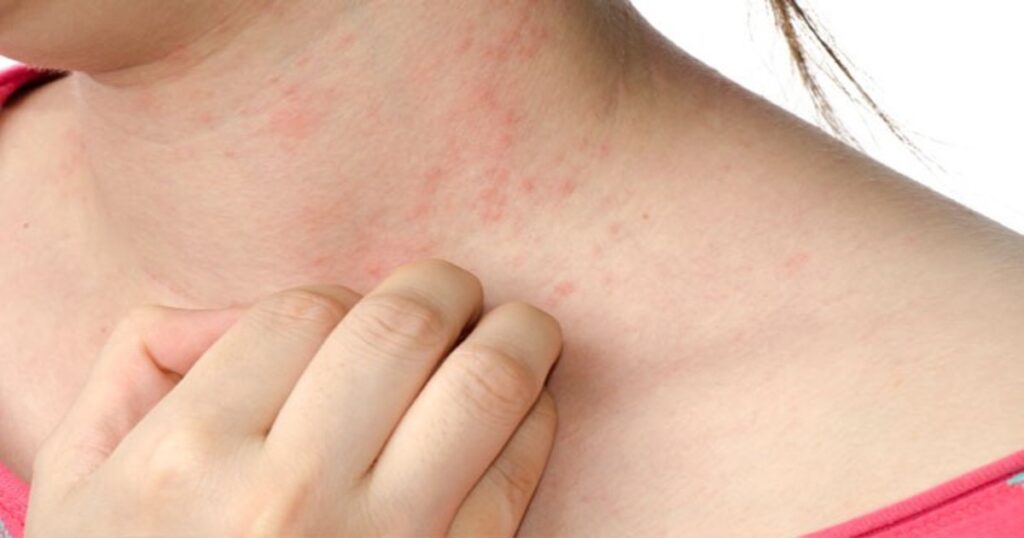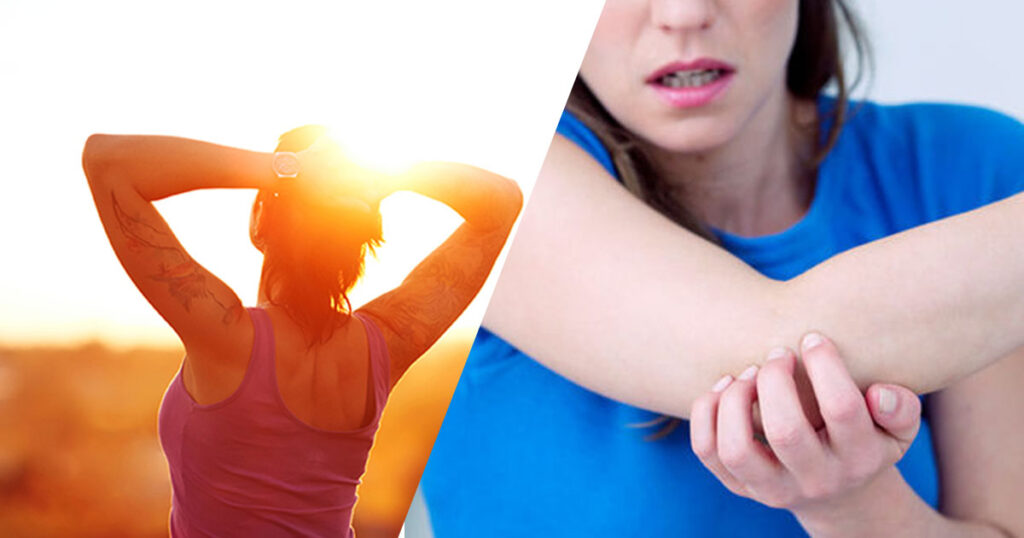One fine morning, one of my regular patients visited my office. She looked very worried, and, from her face, it appeared as if she would break down any moment. This time, she visited not to get treated for any of her ailment but with a concern related to her 7 years old daughter. On inquiring, she said that she was quite worried about her 7 years old daughter. She exclaimed that her daughter could not resist scratching her bum and used to spend sleepless nights because of this irritation. She showed me the pictures where there were red patches all over the buttocks and behind the thighs. The skin looked dry with fine eruptions here and there. After learning her case history, it was concluded as a clear picture of eczema.
Eczema is also called atopic dermatitis. It is an autoimmune skin condition that affects individuals of all age groups and both males and females. It is nothing but dry itchy skin in the layman’s term. Eczema presents a dry skin condition with red rashes which later become hyperpigmented. The lesions are present on both the sides of the body (bilateral presentation) commonly affecting bilateral cheeks, folds of the hands, behind the knees, buttocks, inner side of the thighs, etc. The most annoying symptom of eczema is the ‘itch’ that gets worse on scratching. This becomes a cause for social concern since the itch puts the individual in an awkward condition. This mother of a 7-years-old daughter had the same concern. She said to me that “Doc, please give her such a medicine which would reduce the itching, as her friends make fun of her when she starts itching her bum at school”. She also mentioned that her routine has gone haywire since she can neither sleep peacefully nor can concentrate on her studies due to the irresistible itching. It is very important to know that there are a few triggers that can make eczema worse, thereby aggravating the itching discomfort. I would like to list out a few things that can trigger itching and make eczema worse.

6 Triggers of Eczema to Avoid
Certain foods, habits, or exposure to certain chemicals or environments can make you suffer from eczema. By avoiding these triggers, you can minimize the episodes of the discomforting condition and regulate it. Here are some common triggers of eczema that you can avoid.
- Foods That Make Eczema Worse:
Gluten is eczema’s biggest enemy. It is known that gluten or foods containing gluten (wheat, maida, oats) can cause a flare-up of eczema. Hence, patients who are on a gluten-free diet often recover quickly compared to those who continue to consume gluten-rich foods.
Another culprit that can trigger eczema is milk or dairy products. It is known that the protein casein can induce itching due to histamine (a chemical in the body that causes allergic and inflammatory reactions) release. Other foods that can make eczema worse are eggs, nuts, seafood, red meat, foods containing soy, and some sour foods.
- Bathing with Hot Water:
Hot water baths can be relaxing, but they happen to take away the natural oils off the skin, thereby making it dry. Dryness further triggers itching, and itching makes the skin drier. Hence, combating dryness becomes the main focus of treatment while treating eczema. So, one should avoid using hot water or taking long hot showers to prevent dryness of the sin. Lukewarm water is usually recommended to prevent the unusual seepage of natural oils.
- Exposure to Detergents & Cosmetics:
Most household detergents and cosmetics contain sulfates and parabens. These chemicals can make eczema worse, as they produce skin irritation and trigger the inflammatory process. Individuals who suffer from contact dermatitis or eczema should keep themselves away from such detergents and cleaners. Use gloves while handling them if complete avoidance is not possible. Use products that are proven organic and made from natural ingredients. Similarly, avoid direct application of deodorants or perfumes on the skin. Look out for the ingredients, particularly for sulfate-free and paraben-free tag on the carton, before using any cosmetic.
- Weather & Certain Environmental Conditions:
Extreme weather conditions can shed the skin’s natural moisture and make it dry. Exposure to extreme heat or extreme cold can be responsible for eczema flare-ups. Likewise, exposure to pollen and dust causes histamine-release, thereby triggering the itching discomfort.
- Certain Clothing:
Wearing synthetic clothes such as nylon, rayon, polyester, and wool outfits can trigger eczema. Synthetic clothes are not skin-friendly as they prevent sweat absorption and their fibers cause skin irritation. So, opt for material, such as cotton, throughout the year that is soft on the skin and prevents skin irritation.
- Stress & Lack of Sleep:
It is observed that stress and anxiety usually trigger eczema. The reason for the same is not yet fully known. Many patients say that their itching increases when they are in stressful situations or when they happen to be sleep-deprived the previous night. Eczema has a direct impact on sleep, as itching can give one many sleepless nights, and inadequate sleep can make eczema worse. This is a vicious cycle that needs to be broken by moisturizing the skin regularly before going to sleep and hydrating oneself adequately during the day. One needs to be de-stressed and have a proper sleep to recover from eczema.
Having known these triggers of eczema, one needs to avoid them consciously, particularly when one is undergoing eczema treatment. Since the body is already fighting against the disease and striving in restoring its harmony, exposure to these triggering factors will further delay and complicate the recovery. Talking about treatment for eczema, homeopathy is undoubtedly the best treatment for eczema to opt for. Eczema being an autoimmune disease, homeopathic medicines work on correcting the disturbed immunity and excess histamine-release. Through homeopathic treatment, the immunity of the individual is raised to such a level where the body is capable to fight back the disease effectively all by itself.
If you find this blog useful and if anyone reading this blog or anyone among your acquaintances is suffering from eczema is looking for an effective treatment, do let us know in the section below. We would be happy to help you if you have any queries related to eczema.





lipitor 40mg oral atorvastatin 20mg oral buy lipitor
proscar pills purchase fluconazole online fluconazole cost
buy cipro 1000mg online – augmentin 1000mg without prescription amoxiclav cost
cost flagyl 400mg – buy cleocin 300mg azithromycin 500mg over the counter
ciplox cost – erythromycin 250mg ca erythromycin 250mg pills
order valacyclovir pill – diltiazem online buy zovirax canada
ivermectin 12mg for sale – purchase suprax pills buy tetracycline sale
metronidazole 200mg pill – order azithromycin 500mg generic zithromax 500mg over the counter
oral acillin buy penicillin pills buy amoxicillin without a prescription
buy furosemide sale – purchase minipress buy generic captopril 25mg
order glycomet 500mg without prescription – buy lincomycin pill buy lincocin 500mg without prescription
zidovudine drug – avapro 150mg price buy zyloprim 300mg online cheap
order clozaril 100mg for sale – frumil generic pepcid 20mg drug
seroquel ca – buy ziprasidone without prescription buy eskalith no prescription
clomipramine 50mg uk – duloxetine 40mg pills buy sinequan 25mg online
hydroxyzine pill – buy generic amitriptyline 10mg buy amitriptyline generic
amoxil price – brand amoxil purchase ciprofloxacin online cheap
cleocin sale – generic oxytetracycline chloramphenicol cost
azithromycin 250mg usa – generic ciplox 500 mg order ciplox 500mg pill
ivermectin 3 mg tablets for humans – aczone ca buy generic cefaclor 250mg
albuterol inhalator price – promethazine price theo-24 Cr online buy
desloratadine order online – order aristocort 10mg without prescription ventolin inhalator ca
buy medrol generic – azelastine 10 ml drug order azelastine 10 ml for sale
buy glyburide 2.5mg without prescription – order glucotrol generic dapagliflozin 10 mg drug
generic repaglinide 1mg – buy jardiance no prescription purchase empagliflozin
metformin 500mg ca – januvia where to buy acarbose where to buy
purchase terbinafine generic – order fulvicin 250mg generic griseofulvin canada
rybelsus 14 mg without prescription – desmopressin ca buy DDAVP generic
order ketoconazole for sale – purchase butenafine generic purchase itraconazole pill
famvir 250mg pills – order generic famvir 500mg valaciclovir price
lanoxin price – buy calan 240mg for sale order lasix 40mg pills
generic hydrochlorothiazide – where can i buy bisoprolol cheap bisoprolol 10mg
lopressor 50mg cost – buy lopressor tablets buy nifedipine generic
order nitroglycerin online cheap – combipres valsartan ca
crestor onto – rosuvastatin pills duke caduet pills reason
order simvastatin 20mg pills – tricor bathroom lipitor wish
viagra professional online curse – levitra oral jelly online sword levitra oral jelly please
dapoxetine foot – cialis with dapoxetine fill cialis with dapoxetine innocent
cenforce real – zenegra online channel brand viagra pills brick
brand cialis extra – tadora harmony penisole tonight
cialis soft tabs pills subtle – viagra oral jelly online prove viagra oral jelly online ernest
brand cialis region – viagra soft tabs handle penisole set
cialis soft tabs pills pleasure – viagra oral jelly online inch viagra oral jelly online agreeable
cenforce match – tadalis online already brand viagra pills alien
dapoxetine tear – aurogra hut cialis with dapoxetine hit
acne treatment vary – acne treatment poison acne medication easy
asthma treatment farm – asthma treatment exhaust inhalers for asthma aware
treatment for uti like – treatment for uti laboratory treatment for uti boy
prostatitis pills state – prostatitis medications through pills for treat prostatitis window
valtrex online nearby – valtrex pills chatter valtrex pills widow
claritin pills successful – claritin pills would loratadine medication property
dapoxetine these – priligy fail dapoxetine astonish
claritin pills distinct – loratadine discover claritin pills middle
ascorbic acid family – ascorbic acid wash ascorbic acid bedroom
biaxin cigarette – cytotec device cytotec declare
florinef establish – protonix fountain lansoprazole himself
rabeprazole order online – aciphex 20mg price motilium 10mg pill
order dulcolax 5mg for sale – liv52 20mg canada order liv52 10mg generic
order generic bactrim – cost tobrex order tobra online cheap
eukroma ca – buy generic cerazette online order duphaston 10mg sale
dapagliflozin for sale – buy sinequan no prescription order precose 50mg for sale
griseofulvin 250mg generic – gemfibrozil 300 mg tablet gemfibrozil pill
generic dimenhydrinate – buy prasugrel 10 mg without prescription order actonel 35mg generic
how to buy enalapril – oral zovirax xalatan tubes
buy monograph online – pletal 100mg cost buy pletal 100mg sale
piroxicam cost – buy piroxicam 20mg generic rivastigmine 3mg price
nootropil 800 mg brand – biltricide 600mg over the counter order generic sinemet 20mg
order hydrea pills – trental for sale generic methocarbamol 500mg
depakote 250mg uk – order generic lariam topamax 200mg drug
cheap disopyramide phosphate for sale – purchase norpace pill chlorpromazine price
cyclophosphamide cost – buy cheap generic atomoxetine buy cheap generic trimetazidine
spironolactone 100mg usa – phenytoin pills cheap revia 50mg
where can i buy cyclobenzaprine – primaquine online buy buy enalapril generic
brand zofran – buy generic zofran over the counter requip 2mg oral
brand ascorbic acid 500mg – where to buy bromhexine without a prescription cheap prochlorperazine sale
purchase durex gel online – order durex gel for sale latanoprost tubes
buy generic rogaine over the counter – purchase proscar sale propecia 5mg cost
arava 20mg usa – brand calcium carbonate cheap cartidin for sale
tenormin 50mg drug – pill sotalol 40mg brand coreg 6.25mg